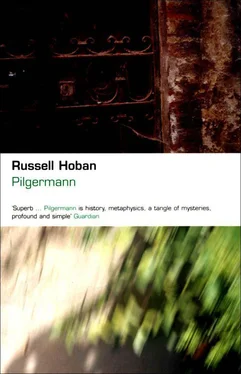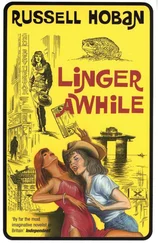Russell Hoban - Pilgermann
Здесь есть возможность читать онлайн «Russell Hoban - Pilgermann» весь текст электронной книги совершенно бесплатно (целиком полную версию без сокращений). В некоторых случаях можно слушать аудио, скачать через торрент в формате fb2 и присутствует краткое содержание. Год выпуска: 2002, Издательство: Bloomsbury Publishing PLC, Жанр: Современная проза, на английском языке. Описание произведения, (предисловие) а так же отзывы посетителей доступны на портале библиотеки ЛибКат.
- Название:Pilgermann
- Автор:
- Издательство:Bloomsbury Publishing PLC
- Жанр:
- Год:2002
- ISBN:нет данных
- Рейтинг книги:5 / 5. Голосов: 1
-
Избранное:Добавить в избранное
- Отзывы:
-
Ваша оценка:
- 100
- 1
- 2
- 3
- 4
- 5
Pilgermann: краткое содержание, описание и аннотация
Предлагаем к чтению аннотацию, описание, краткое содержание или предисловие (зависит от того, что написал сам автор книги «Pilgermann»). Если вы не нашли необходимую информацию о книге — напишите в комментариях, мы постараемся отыскать её.
Pilgermann — читать онлайн бесплатно полную книгу (весь текст) целиком
Ниже представлен текст книги, разбитый по страницам. Система сохранения места последней прочитанной страницы, позволяет с удобством читать онлайн бесплатно книгу «Pilgermann», без необходимости каждый раз заново искать на чём Вы остановились. Поставьте закладку, и сможете в любой момент перейти на страницу, на которой закончили чтение.
Интервал:
Закладка:
The terrified workmen lifted the basket clear and while Firouz composed himself heroically I examined his foot and ascertained that the metatarsal bone was broken. A man was sent for bandages while I set the bone and bound it temporarily with my kaffiya. As I was doing this Firouz said to me, ‘I know that this design has come from your hand and not that of Bembel Rudzuk. It is your Hidden Lion, Jew.’
‘This Hidden Lion belongs to no one person more than to any other,’ I said. ‘It is simply the lion that remains hidden until it reveals itself.’
Yaghi-Siyan seemed unmoved by Firouz’s suffering. He looked down at him and said, ‘Tell me, Firouz, what have you done to this load of tiles that it should fall upon you like this, eh? Did it attack you or was it acting in self-defence? Were you perhaps threatening it? Or were you attempting to extort money from it?’
Firouz drew back his lips from his teeth in a ghastly smile. ‘This was a didactic load of tiles,’ he said. ‘It was teaching us that what is clay can fall.’
‘Also,’ said Yaghi-Siyan, ‘it was teaching you to step carefully.’ He looked steadily at Firouz until Firouz looked away; no more was said between them.
When I had properly bandaged Firouz’s foot I had the thought of further immobilizing the broken bone by stiffening the bandage with clay from the riverbank to enclose the foot in a mud-brick shell. This being done Firouz was set aside to dry in the sun.
‘Will you now write a name of Allah upon me?’ said Firouz to Bembel Rudzuk. ‘Will you fit me into your design?’
‘The tiles in this pattern,’ said Bembel Rudzuk, ‘have not only been dried in the sun; they have also passed through the fire.’
‘Ah!’ said Firouz, but he said no more than that.
Yaghi-Siyan was standing before Bembel Rudzuk with a kind of aggressive humility, impatient for him to leave off paying attention to Firouz. ‘I am told,’ he said, ‘that this tiling is done for its own sake alone.’
‘Your Excellency,’ said Bembel Rudzuk, ‘this that we do here is only a kind of foolishness, a kind of vanity. It is done to be looked at.’
‘I don’t think it is foolishness,’ said Yaghi-Siyan. ‘I sense here the presence of Allah.’
‘That may well be due to your own virtue rather than to anything in the work itself,’ said Bembel Rudzuk.
‘I think not,’ said Yaghi-Siyan. ‘I think that this is something out of the usual run, something extraordinary, even inspired. Most things are a kind of commerce, even most piety: one gives something, one gets something. But this is original, this is abstract; it simply becomes itself, asking nothing.’
‘To hear your Excellency say this of course gives me great pleasure,’ said Bembel Rudzuk.
‘You’re being polite,’ said Yaghi-Siyan; ‘you’re being careful, you’re being closed. Say something careless to me, something open, something abstract.’
‘This is my abstraction,’ said Bembel Rudzuk indicating Hidden Lion with a sweep of his arm. ‘This is my openness, my carelessness, my impoliteness.’
‘May I climb your tower?’ said Yaghi-Siyan.
‘This tower is of course yours, Excellency,’ said Bembel Rudzuk. ‘It is my privilege to invite you to make use of it.’
Yaghi-Siyan went to the tower and now I was able to see the profundity of Tower Gate’s design: towers are naturally dramatic structures that intensify the image of any figure that is to be seen looking down from them. Particularly do they do this when the figure disappears into a doorway at the bottom and then reappears looking over a parapet at the top. But here the stairs round the outside of the tower kept the figure unremarkable by making visible the effort of going from the bottom to the top; at the top the low parapet continued this objectivity. There were to be seen only a little tower, only an ordinary man.
From this nameless tower did Yaghi-Siyan look down on Hidden Lion. Not a breath of air stirred his white burnous, the blue sky was utterly without a sign of anything. At just such an unheralded moment, I thought, might marvels appear to a watcher on a tower: the earth opening up; the kraken rising to the surface of the sea; the mountain lifting itself into the air over the city. It occurred to me that the Unseen might at any moment make use of any pair of eyes to see everything in an altogether different way, a way never thought of before. I felt the earth leap like a fish beneath me. An immeasurable time passed, perhaps it was only a moment, perhaps it is still continuing: the dark face of Yaghi-Siyan; the white burnous; the blue sky; the leaping earth.
When Yaghi-Siyan came down from the tower he looked up to where he had stood, then he looked down at the tiles he was standing on. ‘From there I saw the motion,’ he said; ‘from here I see the stillness. What is it, what is it that moves us? We were the wild horsemen out of the east, Byzantium drew back before us. Now I stand here in this city with a wall around it but the inside is continually rushing to join the outside. Almost I am dizzy with it.’ He began to weep; weeping he bowed his head to the tiles. Then he stood up, walked back to his shoes, put them on, mounted his horse, and rode back to the Governor’s Palace.
12
Time, it seems, has passed. The triangular tiles of Hidden Lion have covered all of Bembel Rudzuk’s stone square, but the pattern has in its turn been so covered by people, by stalls, by booths and tents and awnings that the surge of its action is obscured by the action of every day; the twisting serpents, the shifting pyramids, the appearing and disappearing lions are mostly hidden.
It happened by degrees. I have already told how men, women, and children walked on Hidden Lion in special ways, how they danced on it with particular things in mind, how they gave money which was put into the tiles. Without anyone’s being told the name became known; people used it in giving directions. Hidden Lion became a meeting-place, and in time a man asked permission to establish a coffee stand in the noon shadow of the tower at the centre. Permission was given, and the fragrance of coffee became part of the pattern. Other applicants were quick to follow, and stallholders appeared selling cooked food, melons and oranges, pots and pans, carpets, caged birds, jewelry and weapons. They occupied their spaces rent-free; since the completion of the tiling Bembel Rudzuk had accepted no more money.
Hidden Lion became not only the liveliest of bazaars but also a good-luck place almost sacred to those who had experienced its power. There were lovers who had sworn to each other on a particular tile and by the appropriate names of Allah; there were children at whose birth money had been put into tiles inscribed will the names of Allah The Guide, The Preventer, The Enricher. Bargains were struck, partnerships founded, parents honoured and the dead remembered in the tiles of Hidden Lion.
Every day has a dawn, every day a midnight: sometimes we mark by the one, sometimes by the other. Came the month of July and its days marched like a procession of penitents towards the Ninth of Av; then did I count the days by the nights. When there came the first anniversary of my night with Sophia I paced the roof of Bembel Rudzuk’s house feeling as if I were wrapped in the burning scroll of my love, my lust, my sin, my wisdom, my transcendent mortality. God was poor, I thought, to be immortal.
Towards the middle of August came Ramadhan. The city was like an oven. The sounds of the street withdrew into the silence of exhaustion and the continual growling murmur of the Quran. From that time before dawn when a white thread could be distinguished from a black one the Muslims fasted until sunset, when the call of the mu’addhin like the darkness eased the city into night, prayer, food, and more reciting of the Quran.
Читать дальшеИнтервал:
Закладка:
Похожие книги на «Pilgermann»
Представляем Вашему вниманию похожие книги на «Pilgermann» списком для выбора. Мы отобрали схожую по названию и смыслу литературу в надежде предоставить читателям больше вариантов отыскать новые, интересные, ещё непрочитанные произведения.
Обсуждение, отзывы о книге «Pilgermann» и просто собственные мнения читателей. Оставьте ваши комментарии, напишите, что Вы думаете о произведении, его смысле или главных героях. Укажите что конкретно понравилось, а что нет, и почему Вы так считаете.












